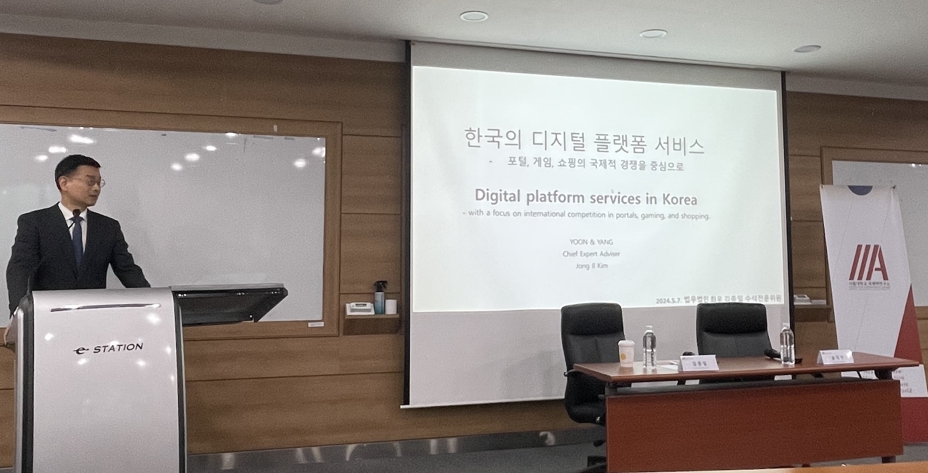The SNU Graduate School of International Studies’ (GSIS) Institute of International Affairs (IIA) has regularly hosted Global Prominence Seminars since 2021. The IIA serves as a hub for fostering insightful interdisciplinary research on contemporary policy matters regarding the economy, politics, and society, producing a substantial corpus of work on domestic and international policy affairs. Previous lectures in the Global Prominence Seminars include “Lessons from European Defense Cooperation for the US-ROK Nuclear Assurance Debate” and “Evolving Shadows: Inside Japan's Strategic Shift and the Policy-Making Dynamics Defining the Future of the Region.”
On May 7, the IIA hosted its 28th Global Prominence Seminar, titled “Digital Platform Services in Korea - with a focus on international competition in portals, gaming, and shopping.” The seminar was presented by Jong-il Kim, the Chief Expert Adviser of the law firm Yoon & Yang LLC, who has worked for twenty years in the platform company industry. The seminar session was moderated by SNU GSIS Professor Ji-yeoun Song, who specializes in the intersection of comparative political economy and social welfare policy.

Jong-il Kim presenting his talk
During the introductory segment of the seminar, Kim emphasized how global competitiveness is becoming more pertinent to our daily lives by outlining various news headlines. He highlighted that recent popular news stories predominantly revolve around the use of information and communication technologies in international trade activities between countries. One such example is the dispute between South Korea and Japan concerning the instant messaging app, Line. Originally developed by Naver and currently a joint venture between Naver and SoftBank Group, Line is the most widely used messaging app in Japan today. In line with that, Japan has expressed unease over its half-ownership by a South Korean company and launched an intense pressure campaign to compel the South Korean owners to sell their stakes. This has consequently spiraled into a matter of important political and diplomatic concern. We can thus see how these issues of global competitiveness and international trade are heavily intertwined with everyday life.
To demonstrate the pervasiveness of platforms to the lives of the average South Korean citizen, Kim categorized commonly-used apps into eight categories: (1) search-centric platforms (Naver, YouTube, Google, Daum, and Instagram), (2) map-centric platforms (Google Maps and Kakao Map), (3) shopping-centric platforms (Coupang and eBay) (4) mobility-centric platforms (Kakao Taxi), (5) automotive-centric platforms (Uber), (6) payment-centric platforms (Kakao Pay, Samsung Pay, Naver Pay, and Payco), (7) metaverse-centric platforms, and (8) blockchain NFT-type platforms. These categorizations demonstrate how ubiquitous digital platforms are in our lives.
The proliferation of global platforms has also triggered a surge in competition among nations to establish their respective regulatory frameworks. As Kim discusses, it thus becomes important to have a body of research into digital platforms themselves and how platform companies can thrive in the face of fierce international competition. He further argued that the issue of platform competitiveness extends beyond national borders and has resonance at an international level. After all, national legislation and international responses cannot help but influence each other as governments engage in power play within a fiercely competitive international arena. It is important for governments to intervene to some extent to safeguard the interests of their corporations and citizens because failure to do so can inhibit the growth of domestic platforms. If the growth of domestic platforms becomes stilted, international platforms can start to dominate the market space. This will, in turn, result in foreign interests gaining access to citizen data through digital platforms, as is happening in Europe. Korea faces the challenge of balancing public safety, national competitiveness, consumer welfare, and employment opportunities in dealing with this issue of platform competitiveness. The throughline was that while South Korea must make moves to protect the competitiveness of domestic platforms, we must be careful not to inadvertently protect international competitors themselves in the process.
The 28th Global Prominence Seminar contained a comprehensive overview of the evolving landscape of digital platform competition by tracing historical trends and highlighting the important decisions policymakers and industry stakeholders must consider in the market of digital platforms. We encourage any SNU students interested in global frameworks of analysis to sign up for the next seminar and engage in fruitful discussions that will shape the future of international affairs.
Written by Hyun Kyung Jung, SNU English Editor, jhyunk@snu.ac.kr

